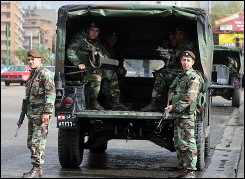 by Jocelyne Zablit, BEIRUT (AFP) Lebanon’s army arrested 17 people on Saturday, including several soldiers, over the shooting deaths of seven people during protests in Beirut that raised fears of civil unrest in a country already gripped by political crisis. "In light of the events that took place on January 27 in the region of Mar Michael and Shiyah and that led to the deaths of seven civilians and left a number of people injured, including soldiers, the military police ordered these arrests," a statement said.
by Jocelyne Zablit, BEIRUT (AFP) Lebanon’s army arrested 17 people on Saturday, including several soldiers, over the shooting deaths of seven people during protests in Beirut that raised fears of civil unrest in a country already gripped by political crisis. "In light of the events that took place on January 27 in the region of Mar Michael and Shiyah and that led to the deaths of seven civilians and left a number of people injured, including soldiers, the military police ordered these arrests," a statement said.
Those detained included three officers, two non-commissioned officers, six soldiers and another six civilians. The statement said some were arrested for causing public disorder and several for illegally carrying weapons. It said 29 civilians, including five minors, had been released after questioning, while the identities of another three suspected of having incited violence were being checked.
The statement said 85 civilians and 120 soldiers had been questioned, and that weapons seized were being tested to see if they had been fired. Sunday’s violence broke out after youths protesting power cuts in the Shiite district of Shiyah entered the nearby Christian area of Ein el-Rommaneh and began throwing stones and setting cars on fire. The situation quickly escalated after a member of the Shiite party Amal was shot in the back.
Youths turned out in several neighbourhoods, setting tyres ablaze and briefly shutting down the main road leading to the airport.
Protests also broke out in the southern coastal cities of Sidon and Tyre and in the eastern Bekaa region.
All of those who died in the riots were Shiite Muslims, including two from the leading opposition party Hezbollah and two from Amal. The seventh victim was a rescue worker who later died from his wounds.
The bloodshed raised fears of civil strife in a country already grappling with its worst political crisis since the end of the 15-year civil war in 1990 and with a series of assassinations mainly targeting anti-Syrian figures.
Ali Ammar, a Hezbollah deputy, accused the army of indiscriminately firing at the protesters and said the military was being used as a pawn by the coalition.
The nation has been embroiled in a deep political and security crisis since the assassination of former premier Rafiq Hariri in February 2005.
The backlash against his killing resulted in Syria withdrawing its forces from its tiny neighbour after a presence of nearly 30 years.
The army chief, General Michel Sleiman, has emerged as the consensus candidate for the post but the two sides are still feuding over the circumstances that should accompany his election.
The Arab League has proposed a three-point plan calling for electing Sleiman as president, forming a national unity government in which no one party has veto power and adopting a new electoral law.
.



